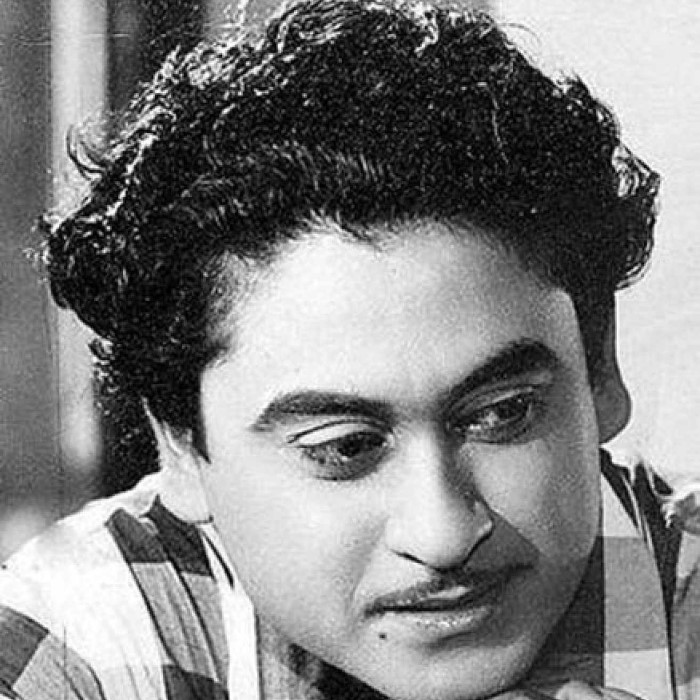No loved tracks found...
Artist Biography
Available in:
Kishore Kumar (born Abhas Kumar Ganguly 4 August 1929 – 13 October 1987) was an Indian playback singer and actor. He was one of the most popular singers in the Indian film industry and from soft numbers to peppy tracks to romantic moods, Kumar sang in different genres but some of his rare compositions which were considered classics were lost in time. According to Ashok Kumar, Kumar's success came because his voice hit the microphone straight at its most sensitive point. He is widely regarded as one of the greatest Indian singers.
Apart from Hindi, he sang in many Indian languages including Bengali, Marathi, Assamese, Gujarati, Kannada, Bhojpuri, Malayalam and Urdu.
After Ashok Kumar became a star of Hindi films, the Ganguly family visited Bombay (now Mumbai) regularly. Abhas Kumar changed his name to 'Kishore Kumar' and started his cinema career as a chorus singer at Bombay Talkies, where his brother worked. Kumar's first film appearance was in Shikari (1946), in which his brother, Ashok played the lead role. Music director Khemchand Prakash gave Kumar a chance to sing "Marne Ki Duayen Kyon Mangu" for the film Ziddi (1948). After this, Kumar was offered many other assignments, but he was not very serious about a film career. In 1949, he settled in Bombay. Kumar played the lead in the Bombay Talkies film Andolan (1951), directed by Phani Majumdar. Although he got some acting assignments with the help of his brother, he was more interested in becoming a singer. But Ashok wanted Kumar to be an actor like him. Between 1946 and 1955, Kumar appeared in 22 films of which 16 were flops and since he was disinterested in taking up acting as a career, he would find ways to be in the bad books of the director or producer, so that they throw him from their films. It was only after the success of films such as Ladki, Naukari, Miss Malaysia, Char Paise and Baap Re Baap that Kumar developed an interest in acting seriously, which resulted in him having successful films as the lead actor between 1955 and 1966.
During the initial stage of his career, Kumar was deeply inspired by singer K. L. Saigal and imitated his style of singing in some of his early films. He had a great respect for poet and musician Rabindranath Tagore who influenced him in many ways.
He was an ardent admirer of Hollywood actor-singer Danny Kaye. He hung the portraits of all these three personalities at his Gouri Kun residence and would bow respectfully before them everyday as a rule.
In his later career, Kumar was also heavily influenced by playback singer Ahmed Rushdi and his liking towards Rushdi was to the extent that former paid a tribute at Royal Albert Hall in London to the latter by singing some of his songs.
Kumar employed yodeling in many of his songs including; Tum bin jaaon kahan, Zindagi ek safar hai suhana, and Chala jata hoon. The style eventually became an essential feature of his singing and was inspired by Jimmie Rodgers and Tex Morton.
Kumar starred in Bimal Roy's Naukari (1954) and Hrishikesh Mukherjee's directorial debut Musafir (1957). Salil Chowdhury, the music director for Naukari, was initially dismissive of Kumar as a singer when he found that Kumar had no formal training in music. However, after hearing his voice, Chowdhury gave him the song Chhota Sa Ghar Hoga, which was supposed to be sung by Hemant Kumar.
The commercially successful films of Kumar included Ladki (1953), Naukari (1954), Baap Re Baap (1955), Paisa Hi Paisa (1956), New Delhi (1956), Naya Andaz (1956), Bhagam Bhaag (1956), Bhai Bhai (1956), Aasha (1957), Chalti Ka Naam Gaadi (1958), Dilli Ka Thug (1958), Jaalsaaz (1959), Bombay Ka Chor (1962), Chacha Zindabad (1959), Man-Mauji (1962), Jhumroo (1961), Half Ticket (1962), Mr. X in Bombay (1964), Shreeman Funtoosh (1965), Ek Raaz (1963), Ganga Ki Lahren (1964), Hum Sab Ustaad Hai (1965), Haal E Dil, Pyar Kiye Jaa (1966), and Padosan (1968). As an actor, his best period was between 1954 and 1966. His onscreen pairing with actresses Mala Sinha, Vyjayanthimala, Nutan, Madhubala and Kumkum gave the biggest hits in his career.
Chalti Ka Naam Gaadi (1958), his home production, had the three Ganguly brothers and Madhubala in main roles. Kumar played a car mechanic who has a romance with a city girl; (Madhubala) with a subplot involving the brothers.:29
In the movie Half Ticket, for one of the songs – "Aake Seedhi Lagi Dil Pe" – the music director Salil Chowdhary had a duet in mind and wanted Kumar and Lata Mangeshkar to sing the song. However, since Lata Mangeshkar was not in town and Salil Chowdhury had to record that song before she could return, Kumar solved the problem by singing both the male and female parts of the song himself. The duet is actually for Pran and Kumar on the screen dressed as a woman. It just turned out to be fine as he did admirably well singing both in male and female voices.
Music director S. D. Burman is credited with spotting Kumar's talent for singing. During the making of Mashaal (1950), Burman visited Ashok's house, where he heard Kumar imitating K. L. Saigal. He complimented him and told him that he should develop a style of his own, instead of copying Saigal. Kumar eventually developed his own style of singing, which featured yodeling, which he had heard on the records of Tex Morton and Jimmie Rodgers.:60S. D. Burman kept making Kishore sing for Dev Anand from the 50s to the early 70s. S. D. Burman provided him the training and encouraged Kumar a lot, especially in the late 50s and early 60s, resulting in Kumar developing into a great singer in the future years.
S. D. Burman recorded Kumar's voice for Dev Anand's Munimji (1954), Taxi Driver (1954), House No. 44 (1955), Funtoosh (1956), Nau Do Gyarah (1957), Paying Guest (1957), Guide (1965), Jewel Thief (1967), Prem Pujari (1970), and Tere Mere Sapne (1971). He also composed music for Kumar's home production Chalti Ka Naam Gaadi (1958). Some of their songs were "Maana Janaab Ne Pukara Nahin" from Paying Guest (1957), "Hum Hain Rahi Pyar Ke" from Nau Do Gyarah (1957), "Ai Meri Topi Palat Ke Aa" from Funtoosh (1956), and "Ek Ladki Bheegi Bhaagi Si" from Chalti Ka Naam Gaadi. Asha Bhosle and Kishore performed duets composed by Burman including "Chhod Do Aanchal" from Paying Guest (1957), "Ankhon Mein Kya Ji" from Nau Do Gyarah (1957), "Haal Kaisa Hai Janaab Ka" and "Paanch Rupaiya Baara Aana" from Chalti Ka Naam Gaadi (1958) and "Arre Yaar Meri Tum Bhi Ho Gajab" from Teen Deviyan (1965).
As a singer, Kumar's work with many music directors in this period includes "Ye Raatein Ye Mausam" and "Hum Toh Mohabbat Karega" from Dilli Ka Thug, "Piya Piya Mora Jiya" from Baap Re Baap, "Hello Hello Ji" from Bombay Ka Chor, "Micheal Hai Toh Cycle Hai" from Bewaqoof, "Ae Haseeno Nazneeno" from Chacha Zindabad, "Zaroorat Hai Zaroorat Hai" from Manmauji (1961), "Likha Hai Teri Ankhon Mein" from Teen Deviaan, "Suno Jaana Suno Jaana", "Pyaar Baatke Chalo" and "Kya Teri Zulfein Hai" from Hum Sab Ustaad Hai, "Khoobsurat Haseena" from Mr. X in Bombay, "Gaata Rahe Mera Dil" from Guide (1965), "Sultana Sultana" from Shreeman Funtoosh, "Machalti Hui" from Ganga Ki Lahren, "Mera Dil Meri Jaan" and "Pyar Ka Jaahan Hotel" from Jaalsaaz and "Yeh Dil Na Hota Bechara" from Jewel Thief (1967).
Music director C. Ramchandra also recognized Kumar's talent as a singer. They collaborated on songs including "Eena Meena Deeka" from Aasha (1957). Kumar's work includes "Nakhrewaali" from New Delhi (1956) by Shankar Jaikishan, "C.A.T. Cat Maane Billi" and "Hum To Mohabbat Karega" from Dilli Ka Thug (1958) by Ravi, and "Chhedo Na Meri Zulfein" from Ganga Ki Lahren (1964) by Chitragupta.
Wide Thumb

Clearart

Fanart




Banner

User Comments
 No comments yet..
No comments yet..

